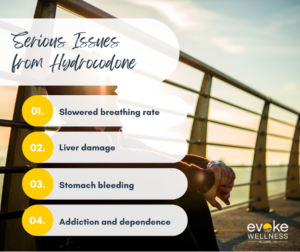Struggling with an addiction to hydrocodone acetaminophen? You’re not alone. Abuse of this powerful prescription painkiller has skyrocketed in recent years, with overdose deaths quadrupling since 1999. But hope isn’t lost – with the right treatment program, you can overcome your addiction and reclaim your life. In this article, we’ll explore the dangers of hydrocodone acetaminophen, look at signs of addiction, and outline your options for getting clean.
Get Help With:
- Prescription drug rehab
- Opioid addiction treatment programs
- Painkiller rehab programs
- Drug detox centers
- Residential treatment program
With knowledge and the right resources, you can start your journey to sobriety today. Recovery is possible – read on to learn more.
If you or a loved one is considering treatment, Evoke Wellness at Hilliard invites you to contact us. Our compassionate team is ready to answer your questions, discuss your needs, and help you take the first steps toward recovery. In Hilliard, you’ll find more than just a treatment program – you’ll discover a community dedicated to your wellness and success. Together, let’s embrace the journey to recovery and the promise of a new beginning. Call us at (833) 949-1347 today or reach out online.
Introduction to Hydrocodone Acetaminophen
You’ve likely heard of hydrocodone acetaminophen – it’s one of the most commonly prescribed opioid medications for pain relief. But do you really understand what it is and how it affects your body?
What Is It?
Hydrocodone acetaminophen is a combination drug that contains two active ingredients:
- Hydrocodone – a semi-synthetic opioid derived from codeine that treats moderate to severe pain.
- Acetaminophen – a non-opioid pain reliever and fever reducer, commonly known as paracetamol.
How It Works
This powerful painkiller works by changing how your brain and body respond to pain signals. The hydrocodone binds to opioid receptors in the brain, reducing the perception of pain. Meanwhile, the acetaminophen blocks pain pathways and reduces inflammation.
However, this potent mix can be highly addictive and comes with severe risks if misused or abused.
Hydrocodone Acetaminophen Side Effects
Common Problems
You may experience constipation, nausea, vomiting, lightheadedness, dizziness or drowsiness. These side effects are common with hydrocodone acetaminophen use.

Taking too much acetaminophen can severely damage your liver. Mixing with alcohol increases these risks. Long-term opioid use leads to physical dependence and addiction.
When to Get Help
If you can’t stop using hydrocodone acetaminophen or experience worsening side effects, seek professional addiction treatment immediately. An opioid addiction treatment program provides medical detox and therapy to overcome dependence safely.
Hydrocodone acetaminophen is intended for short-term pain relief, but carries major health risks with long-term or high-dose use. Don’t ignore the warning signs of opioid dependence or acetaminophen toxicity. Specialized painkiller rehab programs can help you regain your life.
Hydrocodone Acetaminophen May Interact With Other Medications
If you’re taking hydrocodone acetaminophen for pain relief, be aware that it can interact dangerously with other substances. Mixing this powerful opioid with alcohol, benzodiazepines like Xanax, or other medications can cause life-threatening respiratory depression.
Even certain over-the-counter products like cold medicines could heighten the effects of hydrocodone. Always disclose your full medication list to your doctor and pharmacist to avoid harmful drug interactions.
A Deadly Combination
Combining hydrocodone with alcohol or sedatives multiplies the drugs’ depressant effects on the brain and body. This potent mixture can slow or stop your breathing in an overdose situation.
Many tragic overdose deaths involve this lethal poly-substance abuse. Don’t take chances – use hydrocodone only as prescribed and avoid other substances while taking it.
Safe Use Is Key
When used correctly, hydrocodone can provide effective short-term pain relief. But misusing it or mixing it with other drugs is extremely risky behavior that could cost you your life.
If you’re struggling with dependence on hydrocodone or any opioid medication, seek professional help right away from an accredited addiction treatment program. Your health and safety should always come first.
Hydrocodone Acetaminophen Warnings
You need to be extremely careful when taking hydrocodone acetaminophen. This powerful opioid painkiller can quickly lead to addiction and overdose if misused.
Acetaminophen Dangers
- Too much acetaminophen can severely damage your liver.
- Never take more than the recommended dosage on the label.
Hydrocodone Addiction
Hydrocodone is highly addictive – both physically and psychologically. Using it long-term or improperly vastly increases your risk of opioid dependence.
Overdose Risks
Overdosing on hydrocodone can dangerously depress your breathing and potentially cause coma or death. Know the signs and call 911 immediately if an overdose is suspected.
This medication requires close medical supervision. If you or a loved one is battling hydrocodone addiction, seek professional help from an accredited drug detox and rehab program immediately.
How to Take Hydrocodone Acetaminophen
Dosage Guidelines
- Follow your doctor’s instructions carefully. Take the smallest effective dose for the shortest duration possible.
- Never take more than the prescribed amount. Exceeding 4,000mg of acetaminophen per day increases risk of liver damage.
Usage Tips
- Take the medication with food or milk to reduce stomach upset.
- Do not crush or break extended-release capsules/tablets – swallow them whole.
- Avoid alcohol while taking hydrocodone, as it increases drowsiness and risk of overdose.
Side Effects
- Common side effects include nausea, vomiting, constipation, lightheadedness, and drowsiness.
- Notify your doctor immediately if you experience difficulty urinating, shallow breathing, or signs of allergic reaction.
Hydrocodone acetaminophen is intended for short-term pain relief only. Long-term use can lead to dependence and addiction. Seek medical help if you struggle to control your use.
Hydrocodone Acetaminophen Addiction
A Dangerous Combination
You’ve been taking hydrocodone/acetaminophen for pain relief, but now the pills control you. This potent opioid painkiller cocktail is highly addictive – the hydrocodone hooks you while acetaminophen damages your liver over time.
Recognizing the Signs
- Cravings for the drug
- Needing higher doses to get relief
- Withdrawal symptoms when stopping
- Continuing use despite harm
Getting the Right Help
Your addiction requires professional treatment. An opioid addiction treatment program provides medical detox to manage withdrawal, plus therapy to address root causes. A residential treatment program offers a safe, supportive environment. Don’t go it alone – specialized painkiller rehab and drug detox centers give you the best chance to reclaim your life.
Overcoming Your Hydrocodone Acetaminophen Addiction
You can break free from the chains of hydrocodone acetaminophen addiction. The path isn’t easy, but with the right support, you’ll reclaim your life.
Seek Professional Help
Attempting to quit cold turkey can be dangerous. Enroll in a reputable prescription drug rehab or opioid addiction treatment program for medical supervision during detox.
Embrace a Comprehensive Approach
A holistic painkiller rehab program addresses the physical, psychological, and emotional aspects of addiction. Counseling, behavioral therapies, and peer support groups equip you with coping strategies for lasting recovery.
Consider Residential Care
A residential treatment program provides a safe, trigger-free environment to focus solely on healing. Around-the-clock care and structure foster stability during early recovery.
The road may seem daunting, but you’re not alone. Specialized drug detox centers have the expertise to guide you every step of the way toward a hydrocodone acetaminophen-free future.
Hydrocodone Acetaminophen FAQs
What is hydrocodone acetaminophen?
- A combination medication containing hydrocodone (an opioid) and acetaminophen (pain reliever).
- Prescribed for moderate to severe pain relief.
How does it work?
Hydrocodone binds to opioid receptors in the brain and body, reducing pain perception. Acetaminophen enhances pain relief by a different mechanism.
What are the risks?
- Highly addictive due to the opioid component.
- Overdose can lead to liver damage from acetaminophen.
- Respiratory depression is a dangerous side effect.
How is addiction treated?
A medical detox program followed by comprehensive addiction treatment is recommended, which may include:
- Medication-assisted treatment
- Behavioral therapies
- Counseling
- Support groups
- Holistic therapies
The path to recovery requires professional help. Don’t try to quit alone – the risks are too high.
Conclusion
You now have the tools to overcome hydrocodone addiction. With the right treatment program, you can reclaim your life. Don’t wait – reach out for help today. A residential treatment program with medical detox can help you safely withdraw. Follow up with counseling and group support. Lean on loved ones for encouragement. Take it one day at a time on the road to recovery. You have so much to live for. Start believing in yourself again. The future is bright once you break free of addiction’s grip. You deserve to be happy and healthy. Make the call and take the first step toward the life you want. With persistence and self-care, you will succeed.
Begin Your Journey with Evoke Wellness at Hilliard
If you or a loved one is considering treatment, Evoke Wellness at Hilliard invites you to contact us. Our compassionate team is ready to answer your questions, discuss your needs, and help you take the first steps toward recovery. In Hilliard, you’ll find more than just a treatment program – you’ll discover a community dedicated to your wellness and success. Together, let’s embrace the journey to recovery and the promise of a new beginning. Call us at (833) 949-1347 today or reach out online.



